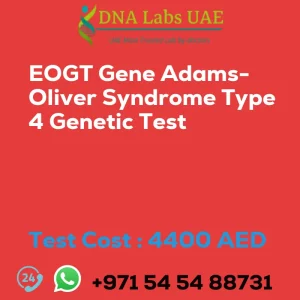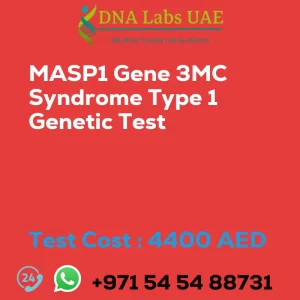EFEMP2 Gene Cutis laxa type 1B autosomal recessive Genetic Test
At DNA Labs UAE, we offer the EFEMP2 Gene Cutis laxa type 1B autosomal recessive Genetic Test. This test is designed to identify specific genetic variants or mutations in the EFEMP2 gene, which is associated with a genetic condition called Cutis laxa type 1B. Cutis laxa is a rare connective tissue disorder characterized by loose, sagging skin that is often wrinkled and hangs in folds.
Price: 4400.0 AED
Sample Condition: Blood or Extracted DNA or One drop Blood on FTA Card
Report Delivery: 3 to 4 Weeks
Method: NGS Technology
Test Type: Osteology Dermatology Immunology Disorders
Doctor: Dermatologist
Test Department: Genetics
Pre Test Information
Before undergoing the EFEMP2 Gene Cutis laxa type 1B autosomal recessive Genetic Test, it is important to provide the clinical history of the patient. Additionally, a genetic counseling session may be conducted to draw a pedigree chart of family members affected by the EFEMP2 gene.
Test Details
The EFEMP2 gene is associated with Cutis laxa type 1B, which is inherited in an autosomal recessive manner. This condition is characterized by loose, sagging skin that can affect various parts of the body. Our NGS genetic testing technology allows for the simultaneous analysis of multiple genes, including EFEMP2. By analyzing the EFEMP2 gene, healthcare providers can identify disease-causing mutations and provide a diagnosis for Cutis laxa type 1B.
Genetic testing for Cutis laxa type 1B can be valuable in confirming a diagnosis, understanding disease progression and prognosis, and guiding treatment decisions. It also provides important information for family planning purposes, allowing individuals and couples to assess their risk of having a child with the condition.
It is important to note that genetic testing should be conducted and interpreted by healthcare professionals with expertise in genetics. Genetic counseling is recommended before and after the test to ensure individuals and families understand the implications of the results and can make informed decisions.
| Test Name | EFEMP2 Gene Cutis laxa type 1B autosomal recessive Genetic Test |
|---|---|
| Components | |
| Price | 4400.0 AED |
| Sample Condition | Blood or Extracted DNA or One drop Blood on FTA Card |
| Report Delivery | 3 to 4 Weeks |
| Method | NGS Technology |
| Test type | Osteology Dermatology Immunology Disorders |
| Doctor | Dermatologist |
| Test Department: | Genetics |
| Pre Test Information | Clinical History of Patient who is going for EFEMP2 Gene Cutis laxa type 1B, autosomal recessive NGS Genetic DNA Test. A Genetic Counselling session to draw a pedigree chart of family members affected with EFEMP2 Gene Cutis laxa type 1B, autosomal recessive NGS Genetic DNA Test gene EFEMP2 |
| Test Details |
The EFEMP2 gene is associated with a genetic condition called Cutis laxa type 1B, which is inherited in an autosomal recessive manner. Cutis laxa is a rare connective tissue disorder characterized by loose, sagging skin that is often wrinkled and hangs in folds. This condition can affect various parts of the body, including the face, neck, and limbs. NGS (Next-Generation Sequencing) genetic testing is a type of genetic testing that allows for the simultaneous analysis of multiple genes, including the EFEMP2 gene. This type of testing can identify specific genetic variants or mutations that may be responsible for the development of Cutis laxa type 1B. By analyzing the EFEMP2 gene using NGS technology, healthcare providers can determine if an individual carries any disease-causing mutations in this gene. This information can help with the diagnosis of Cutis laxa type 1B and provide important insights into the inheritance pattern and potential risks for other family members. Genetic testing for Cutis laxa type 1B can be useful for confirming a diagnosis, providing information about disease progression and prognosis, and guiding treatment decisions. It can also be valuable for family planning purposes, as it allows individuals and couples to assess their risk of having a child with the condition. It is important to note that genetic testing should be conducted and interpreted by healthcare professionals with expertise in genetics. Genetic counseling is often recommended before and after genetic testing to help individuals and families understand the implications of the test results and make informed decisions. |








